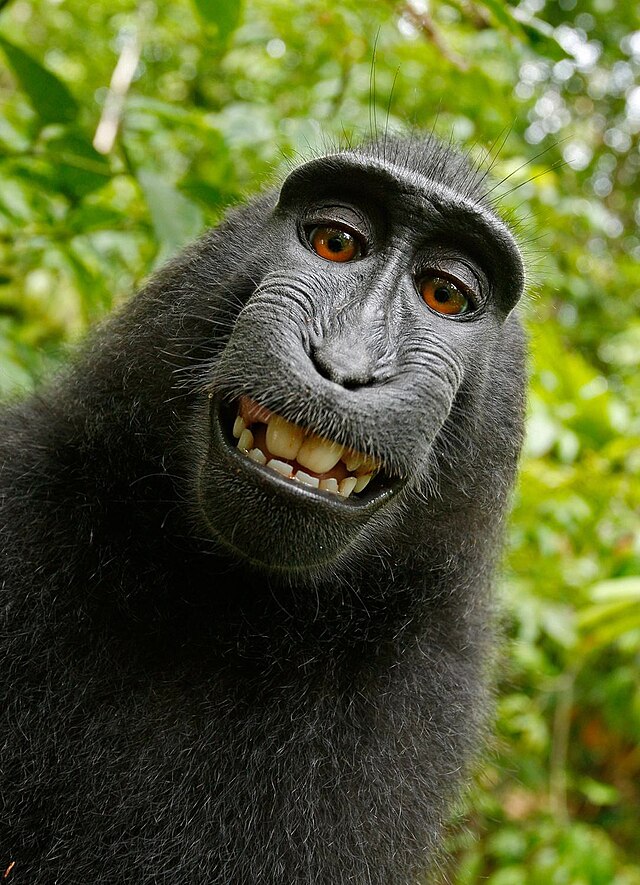It was an hilarious picture which was shared around the world but also caused one of the year's most complex legal issues.
When this cheeky monkey took a selfie on a photographer's camera, it led to questions about who owned the copyright - the monkey or the snapper.
But now the US copyright office has finally made a decision, judging that neither hold any rights.
It has ruled that any work created by an animal does not belong to them or anyone else. This also includes plants, nature, divine or supernatural beings.
- Anthony Bond, The Daily Mirror, 22 Aug 2014
Dear, oh dear, oh dear, oh dear, oh dear.
Whilst I suspect most people will look at "Monkey Selfie" and think that this is amusing, I think that this is a terrible miscarriage of justice and sets a very dangerous precedent.
The US copyright office has now basically said that when an animal takes a photograph, copyright can not be claimed by the person who went to the effort of setting up the equipment which enabled the photograph to even exist in the first place.
Although it should sound obvious, a Professional Photographer derives their income from the sale of the images they produce; those images require effort to produce. Copyright in principle is about making sure that artists are compensated for that effort. The production of art in general as with anything requires effort, be that physical or intellectual or otherwise, in my opinion should be duly rewarded for that effort.
The issue surrounding Monkey Selfie, stems from the fact that Wikimedia unilaterally asserted because the photograph which had originally appeared in a Daily Mail article was the work of a non-human animal, then copyright could not vest with a legal person; as it could not vest with a legal person, it fell into the public domain.
What I think that this says is that Wikimedia has asserted that Mr Slater doesn't deserve to be paid for his work, despite the fact that he set up a photo shoot and owns the camera equipment, and that's bad. This also sends out a strong price signal over the value of photographs.
- apparently I am legally allowed to use this, as it has fallen into the public domain
Economist Friedrich Hayek described a "price signal" in his 1988 work "The Fatal Conceit" as something which communicates the value of something via the mechanism of changes in prices. If something is valued at zero, which is the net result of declaring something to be in the public domain because no economic rights can be derived from it, then you may as well copy something which is worthless.
The free market establishes one thing and one thing only - price. The free market does not establish what is morally or legally right. It was the free market incidentally which determines why someone in Bangladesh can be paid $4 a week to make clothing; in conditions that are unsafe. People if they can get away with it, will want to pay nothing for everything.
The problem with paying nothing though, is that is doesn't compensate people for their effort and in effect, doesn't put food on the table; doesn't keep the rent collectors or the utility companies from the door.
In this case, I am very much reminded of the opening few words of the old Clause IV of the British Labour Party:
"To secure for the workers by hand or by brain the full fruits of their industry..."
Is a labourer worthy of their wages? Why shouldn't the fruits of labour come to those that labour?
In that Daily Mirror article I quoted, Mr Slater's complaint is pretty well much that sentiment.
"It makes me very angry, I'm a professional photographer - it costs me over £2,000 to do the trip. It's my livelihood.
You take 20,000 shots to get one image that sells, it was potentially a good earner for me, I've lost over £10,000 because of it."
- Anthony Bond, The Daily Mirror, 22 Aug 2014
I'd even further suggest that this sends a very strong message to professional photographers: DO NOT under any circumstances give your camera equipment to anyone else. Never let an animal take another selfie ever again.
Linky things:
The Sulawesi Macaques who took this: http://www.djsphotography.co.uk/Tropical%20Forests/Sulawesi%20Macaques.htm
David Slater's Website: http://www.djsphotography.co.uk/


No comments:
Post a Comment